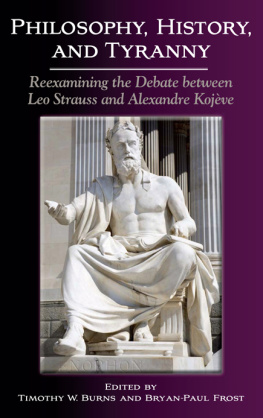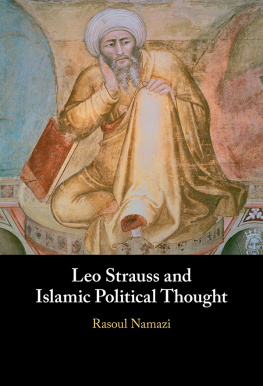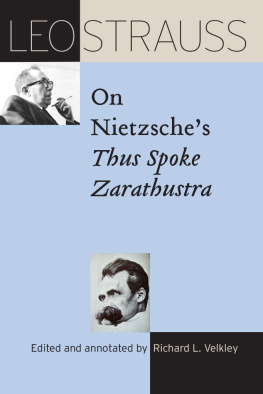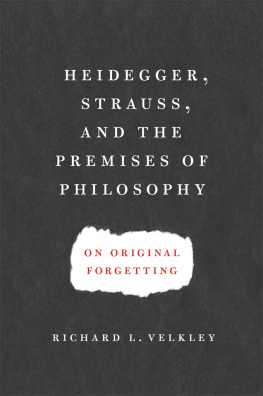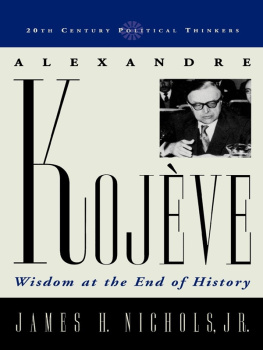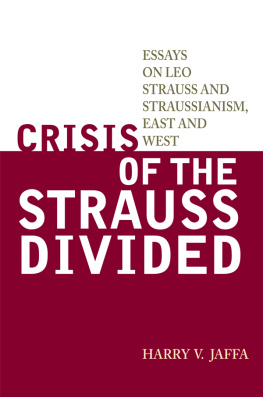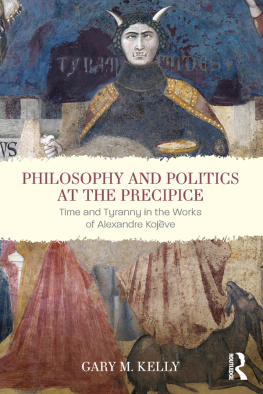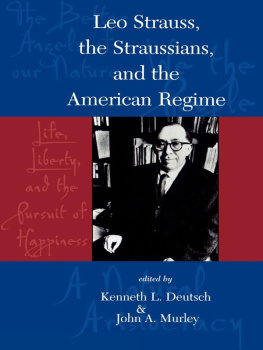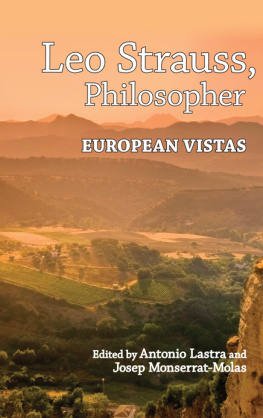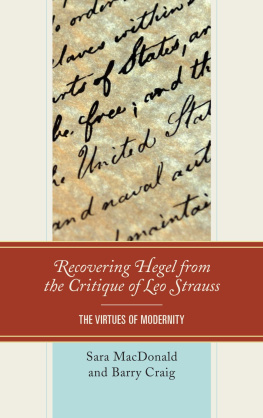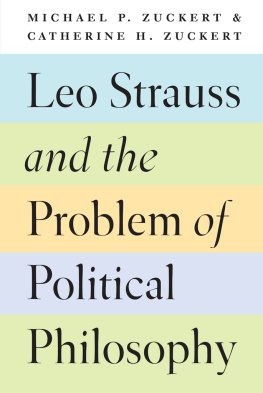PHILOSOPHY, HISTORY, AND TYRANNY
SUNY series in the Thought and Legacy of Leo Strauss Kenneth Hart Green, editor
PHILOSOPHY,
HISTORY,
AND
TYRANNY
Reexamining the Debate between
Leo Strauss and Alexandre Kojve
EDITED BY
Timothy W. Burns and Bryan-Paul Frost
Cover image of Xenophon from bigstock.com
Published by State University of New York Press, Albany
2016 State University of New York
All rights reserved
Printed in the United States of America
No part of this book may be used or reproduced in any manner whatsoever without written permission. No part of this book may be stored in a retrieval system or transmitted in any form or by any means including electronic, electrostatic, magnetic tape, mechanical, photocopying, recording, or otherwise without the prior permission in writing of the publisher.
For information, contact State University of New York Press, Albany, NY
www.sunypress.edu
Production, Diane Ganeles
Marketing, Michael Campochiaro
Library of Congress Cataloging-in-Publication Data
Names: Burns, Timothy, 1958- editor
Title: Philosophy, history, and tyranny : reexamining the debate between Leo Strauss and Alexandre Kojeve / edited by Timothy W. Burns and Bryan-Paul Frost.
Description: Albany : State University of New York Press, 2016. | Series: Suny series in the thought and legacy of Leo Strauss | Includes bibliographical references and index.
Identifiers: LCCN 2016005970 | ISBN 9781438462097 (hardcover : alk. paper)
Subjects: LCSH: Strauss, Leo. | Strauss, Leo. On tyranny. | Xenophon. Hieron. | Kojve, Alexandre, 1902-1968. | Kojve, Alexandre, 1902-1968. Tyrannie et sagesse. | Political sciencePhilosophy. | Despotism. | Fukuyama, Francis. End of history. | HistoryPhilosophy.
Classification: LCC B945.S84 P48 2016 | DDC 321.9dc23 LC record available at https://lccn.loc.gov/2016005970
10 9 8 7 6 5 4 3 2 1
Contents
T IMOTHY W. B URNS AND B RYAN -P AUL F ROST
T IMOTHY W. B URNS
M URRAY S. Y. B ESSETTE
D ANIEL E. B URNS
N ASSER B EHNEGAR
B RYAN -P AUL F ROST
M ARK J. L UTZ
W ALLER R. N EWELL
R ICHARD L. V ELKLEY
J AMES H. N ICHOLS , J R .
E MMANUEL P ATARD
A LEXANDRE K OJVE
Acknowledgments
T he editors would like to thank Perry Cartwright and the University of Chicago Press for kindly giving us permission to republish the English translation of Alexandre Kojves Tyranny and Wisdom (in Leo Strauss, On Tyranny , eds. and trans. Victor Gourevitch and Michael S. Roth [Chicago: University of Chicago Press, 2013], 135176). Jordan Kellman, dean of the College of Liberal Arts at the University of Louisiana at Lafayette, graciously defrayed the costs of securing these permission rights. Nina Kousnetzoff willingly allowed the State University of New York Press and Emmanuel Patard to publish in English translation material from the Fonds Kojve at the Bibliothque nationale de France. Kenneth Hart Green, editor of the State University of New York Press series in the Thought and Legacy of Leo Strauss, encouraged us to include the present volume in this series, and Michael Rinella, senior acquisitions editor at the State University of New York Press, supported the project from the beginning by giving the editors an advance contract. The editors gratefully acknowledge the efforts of the aforementioned individuals, as well as the authors in this volume, for contributing to this project. It is a pleasure to know that interest in the Strauss-Kojve debate remains vibrant, and that such a diverse group of persons was willing to help to bring this edited volume to completion.
Introduction
T IMOTHY W. B URNS AND B RYAN -P AUL F ROST
T he years 20132014 marked several anniversaries in respect to the debate between Leo Strauss and Alexandre Kojve in the formers On Tyranny .
With precision, economy, and often startling clarity, these thinkers put forward the basic ideas and foundational premises of classical and modern political thought. Indeed, they go so far as to suggest that if either one of them is wrong then the other must be right in all or most things, implying that these are two of the most fundamental alternatives in human life and thought. Although diametrically opposed in the answers to almost all of the most important questions, they seem to agree completely on what those most important questions are, as is evidenced from the debate itself: How does one read and interpret a philosophic text? Has Biblical faith transformed human consciousness? Is history a rational and purposive process? Can political life ever be fully rational and satisfying? What is the character of philosophy and politics? What is the highest way of life, and how is it accurately characterized? Indeed, it is hard to imagine a question of genuine political significance that is not somehow addressed or touched on in their exchange. Of course, this does not mean that the debate stands as the final and most authoritative or mature expression of their thoughts: Both went on to write a number of other works after this one, and their philosophic correspondence began to cool after the publication of the debate. Nevertheless, there is a freshness to this debate; it has remained remarkably crisp over time, and neither thinker ever disavowed what he claimed therein.
For the best account of the genesis of the debate, we refer the reader to Emmanuel Patards preface to his critical edition of Strausss Restatement, which includes extensive references to the We here limit ourselves to providing some brief biographical information for readers who might be unfamiliar with the two friendly protagonists.
Brief Biographies of Strauss and Kojve
Leo Strauss was born in Prussia in 1899 and attended the University at Marburg, and then Hamburg, where he wrote his doctoral thesis under Ernst Cassirer. He immigrated to New York in 1937, and, after a research fellowship at Columbia University, was a visiting lecturer at a number of colleges before receiving more permanent employment at the New School for Social Research. In 1949 he joined the political science faculty at the University of Chicago, teaching there until 1967. He then spent three semesters at Claremont Mens College, and four years at St. Johns College, Annapolis. He died in 1973, having published fifteen books and numerous articles in scholarly journals.
Strauss followed Goethe in seeing the struggle between belief and unbelief, or the question of the source of the obligations by which we guide our lives, as the deepest theme of all world and He made clear that he was assisted in this effort by Martin Heideggers shaking of the calcified tradition of Western philosophy.
Strauss stressed that his writings were appearing at a time when the possibility of philosophy, understood as reasons search for enduring truth, so far from being taken for granted, had been radically called into question by the works of Nietzsche and Heidegger. Partly as a result of that questioning, the West had come to be characterized by a protracted collapse of confidence in the possibility of discovering, through reason, a genuine, universal understanding of the world, one by which we can and should take our bearings. Through his lifes work as a teacher and a scholar, Strauss faced and led others to face that situation squarely, and guided the way both to a recovery of the original ground for the rational life in Socratic political philosophy and to a respectful, painstakingly careful account of the developments in modern political philosophy that have led to our current situation. In the original On Tyranny and in the subsequent debate with Kojve, as the essays in this volume attest, all of these matters are at issue.

